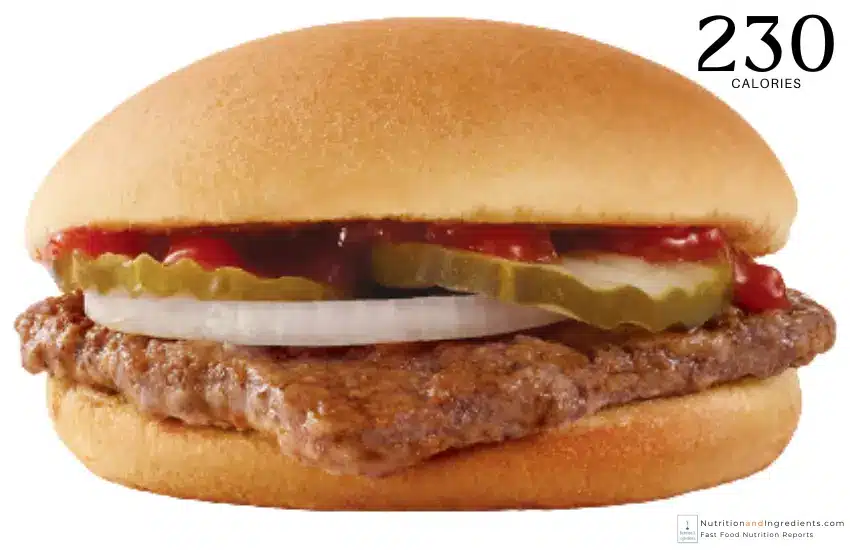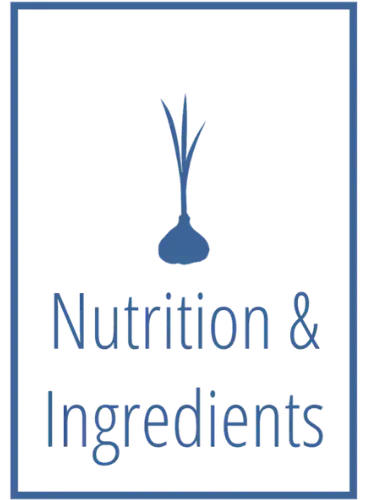Wendy’s Jr. Hamburger

Made with fresh beef, the Jr. Hamburger is topped with pickles, onion, ketchup and mustard, and served on a toasted bun.
One Jr. Hamburger from Wendy’s contains 230 calories, 10 grams fat, 24 grams carbohydrates, and 12 grams protein.
Read this guide for a detailed overview of the nutrition facts, calories, ingredients, and allergens in the Jr. Hamburger from Wendy’s fast food restaurant.
Wendy’s Jr. Hamburger Nutritional Information
Nutrition facts are based on standard formulations for a single serving measured as one Jr. Hamburger, excluding substitutions or extra add-ons.
Calories
There are 230 calories in one burger.
Here is a summary of the calories by macronutrient per serving:
Carbohydrates make up 41% of the total calories. Dietary fats contribute 39% of the calories, and the remaining 20% is from protein.
Wendy’s Jr Hamburger
% calories from fat, carbs and proteinCalories by macronutrient are rounded estimates based on the nutrition facts information provided by Wendy’s fast food restaurant. Actual calories in your order may vary as a result of how the burger is prepared onsite.
Time to Burn Calories
An average adult would need to run at a moderate pace for approximately 20 minutes to burn off the calories from Wendy’s Jr. Hamburger.
Here is a list of approximate times required to burn 230 calories, by type of exercise.
FITNESS TIME TO BURN 230 CALORIES
Estimate based on moderate level of activity by an adult with average BMI.
Nutrition Facts
Review the table below for nutrition facts in Wendy’s fast food burger topped with pickles, onion, and ketchup.
Wendy’s jr hamburger
Amount (%DV) per burger
Red indicates a high %DV.
|
Calories |
230 |
%DV |
|
Total Fat |
10g |
13% |
|
Saturated Fat |
4g |
20% |
|
Trans Fat |
0g | |
|
Cholesterol |
25mg |
8% |
|
Sodium |
470mg |
20% |
|
Carbohydrates |
24g |
9% |
|
Dietary Fiber |
1g |
4% |
|
Total Sugars |
5g | |
|
Protein |
12g |
%DV based on a 2,000 calorie diet. Calorie needs vary and your %DV may be higher or lower. Provided for informational purposes only. Consult with your physician for dietary or healthcare advice.
Sodium
There are 470 milligrams of sodium in a Jr. Hamburger from Wendy’s.
That amount of sodium has a 20% daily value, which means it’s 20% of the recommended limit for a full day. That is high for a single serving of food.
Keep that in mind if you plan to order the hamburger with a side of french fries. Together, the combo meal contains a substantial amount of sodium.
Check nutrition facts for Wendy’s full menu.

Ingredients and Allergens in Hamburger
Wendy’s hamburger is made with a beef patty, pickles, and onion. It’s topped with ketchup and mustard and served on a warm plain top bun.
The crinkle cut pickles contain the preservative sodium benzoate.
Here are the ingredients in Wendy’s Jr. Hamburger.
Ingredients
|
Beef Patty |
|
Ground Beef prepared with Salt |
|
Bun |
|
Wheat Enriched Flour, Water, High Fructose Corn Syrup, Sugar, Yeast, Soybean Oil, Salt, Calcium Peroxide, Calcium Propionate (preservative), Annatto Extract and Turmeric Extract (for color), Dough Conditioners, Enzyme Blend (wheat flour, calcium sulfate, enzymes, and ascorbic acid), Natural Flavor, Sesame Flour, Turmeric and Paprika, Vital Wheat Gluten, Whole Grain Corn Flour, Yeast Nutrient (ammonium sulfate), Yellow Corn Flour |
|
Sliced Pickles |
|
Cucumber, Water, Distilled Vinegar, Salt, Calcium Chloride, Sodium Benzoate, Lactic Acid, Natural Flavors, Polysorbate 80, Turmeric |
|
Ketchup |
|
Tomato Concentrate from Red Ripe Tomatoes, Distilled Vinegar, High Fructose Corn Syrup, Corn Syrup, Salt, Natural Flavoring, Spices, Onion Powder |
|
Mustard |
|
Water, Distilled Vinegar, Mustard Seed, Salt, Turmeric (for color), Paprika, Spice |
|
Other Ingredients |
|
Onion |
Allergens
The hamburger is made with ingredients that include egg, sesame, and wheat.
If you have a food allergy, check the full list of disclosed allergens in Wendy’s menu items. Consult with your physician before deciding which food is right for you.
Nutrition facts, prices, and ingredients are based on available information as of the date of publication. Restaurants and food manufacturers may change recipes or formulations without notice. Check package labels and ask the product manufacturer or restaurant for the most up-to-date information. Unless otherwise stated, %DV is based on a 2,000 calorie diet. All reports and reviews published on this site are for informational purposes only. NutritionandIngredients.com does not provide healthcare advice or dietary recommendations. Always consult your licensed physician for any healthcare or dietary advice.
Nutrition facts, ingredients and image source: The Wendy’s Company. Burger image courtesy of The Wendy’s Company. Original designs by Nutrition & Ingredients for the purposes of research and commentary related to fast food reviews.
